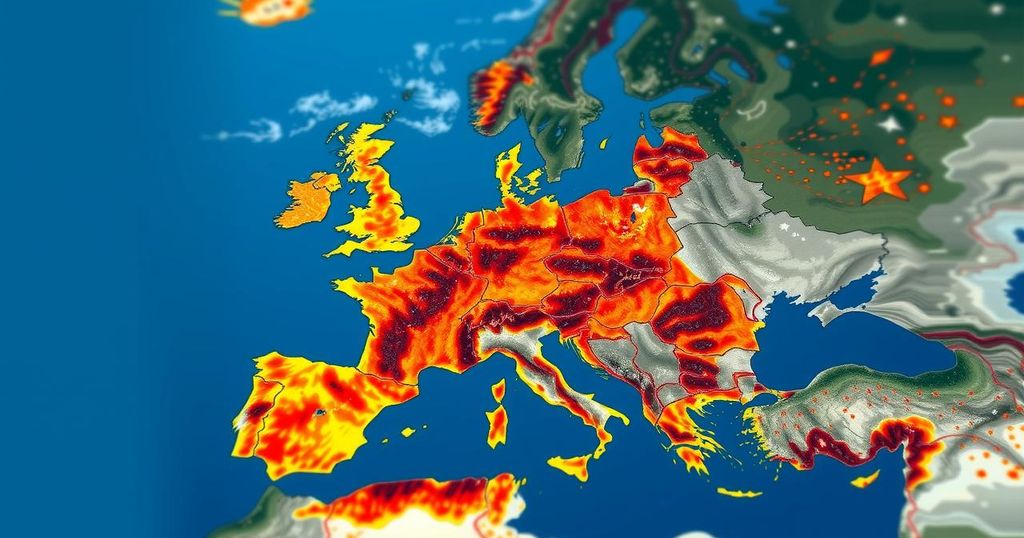2024 Expected to Set Record as Hottest Year Amid Climate Crisis

The Copernicus Climate Change Service reports that 2024 will likely be the hottest year on record, surpassing 1.5 degrees Celsius above pre-industrial levels. This comes as global leaders prepare for crucial UN climate negotiations in Azerbaijan. The record temperatures and extreme weather events exemplify the urgent need for enhanced climate action, as warned by scientists.
According to the Copernicus Climate Change Service, 2024 is anticipated to be the hottest year in recorded history, with temperatures exceeding 1.5 degrees Celsius above pre-industrial levels. This alarming milestone comes just ahead of the UN climate negotiations in Azerbaijan, where global leaders will convene to discuss strategies for reducing greenhouse gas emissions. The agency documented that last month, October, was marked by extreme weather events including significant flooding in Spain and Hurricane Milton in the United States, reinforcing the urgent need for action on climate change. The European climate monitor revealed that temperatures are forecasted to rise more than 1.55 degrees Celsius above the average from 1850-1900, which raised concerns as scientists indicate that the threshold of 1.5 degrees Celsius is rapidly becoming unattainable. Despite the worrisome rise in temperatures, Copernicus clarified that such year-to-year fluctuation does not violate the Paris Agreement, which aims to maintain global temperature increases well below 2 degrees Celsius over the decade. Samantha Burgess, Deputy Director of Copernicus, stated, “It is now virtually certain that 2024 will be the warmest year on record and the first year of more than 1.5C above pre-industrial levels.” She emphasized that this moment represents a significant juncture in global climate trends and should impel more ambitious measures at the upcoming conference, COP29. As the international community prepares for critical negotiations, they face the backdrop of mixed political climates, notably the potential reelection of former US President Donald Trump, who previously withdrew the US from the Paris Agreement. Heightened global temperatures and increasing levels of greenhouse gases are driving severe weather patterns worldwide, illustrating the direct consequences of climate change. Copernicus noted the heightened sea surface temperatures and severe drought affecting significant populations in the US. Further analysis indicates that the current conditions may represent the hottest climate the Earth has experienced in the last 100,000 years, an alarming statistic that calls for immediate global attention. It emphasizes the need for a coordinated international response that not only adheres to established climate agreements but also proactively addresses forthcoming challenges posed by climate change.
The recent findings from the Copernicus Climate Change Service are critical in the context of rising global temperatures and extreme weather events. Climate change, driven primarily by carbon emissions from fossil fuel combustion, poses escalating threats to ecosystems, human health, and global economies. With COP29 approaching, the emphasis on urgent climate action is paramount. Scientists are increasingly concerned that the targets set by the Paris Agreement may not be sufficient to avoid the crippling impacts of climate change, especially as current trajectories suggest harsh future scenarios, including a potential 3.1 degrees Celsius rise in global temperatures this century. Understanding these urgent challenges and the scientific data informing them is essential for comprehensive climate policy development.
In summary, the Copernicus Climate Change Service has forecasted that 2024 will likely be the hottest year on record, surpassing crucial temperature thresholds. The upcoming UN climate negotiations serve as a pivotal opportunity for global leaders to intensify efforts towards drastic reductions in greenhouse gas emissions. Scientific data underscores the urgency of this moment, reminding us of the severe and compounding consequences of inaction. The convergence of political and environmental pressures may dictate the effectiveness of upcoming strategies aimed at combating climate change.
Original Source: www.barrons.com






